Local
entrepreneurs earn more than a million during the BAHANDI Food and
Fashion Fair

By DTI-Regional Operations Group
September 21, 2021
MAKATI CITY – The
Trade Fair was participated by 41 assisted entrepreneurs of DTI from
Leyte, Biliran, Samar, Eastern Samar and Northern Samar. There were
new participating entrepreneurs who were given the chance and
opportunity to launch their products in the market.
Some of the new products
include marinated bangus and kueking – an embutido-like roll made of
shrimp, crab and fish. It was noticeable that several seafood
products were available than in the previous fairs.
There was also a live
online selling on the second day where interested buys were
inquiring about the featured products. It is available in the DTI
Region 8 Facebook Page for those who would like to check out the
available products and list in advance before going to then fair.
It is also in the Bahandi
Food and Fashion Fair where an association of rebel returnees
participated and sold their products for the first time. The
association is the Carigara Peace and Development Workers
Association, which brought their liquid dishwashing soap, pili
products, and bukorillo. They were glad that their products sold
fast even if it is their first time.
DTI Region 8 paves way for
assisted ELCAC Beneficiaries to promote their products, improve on
it and increase their capacity to do business as means of livelihood
and support a sustainable change in their lives.
According to Kath, one of
the members of the association, “Hinihikayat pa namin yung iba na
bumaba na dahil totoo ang tulong ng gobyerno.”
DTI hope that in the
succeeding fairs this year, more local entrepreneurs assisted by its
various programs will participate in the fair, especially those who
opened their business during the pandemic.
Drainage
improvement in Barangay Tarabucan completed
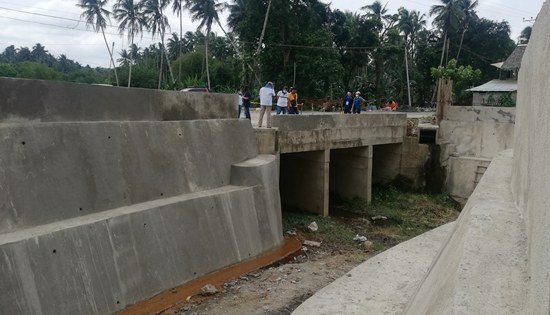
By
GISSELLE G. PARUNGAO
September 21, 2021
CALBAYOG CITY – A
P49.09-million drainage with flood control structure is constructed
and upgraded in Barangay Tarabucan, Calbayog City has been
completed, said Samar First District Engineering Office.
The structure has
three-barrel reinforced concrete box culvert with a height of three
(3) meters and length of 22 meters in replacement to the old
reinforced concrete pipe culvert to make it sturdier and can
accommodate large volume of water to pass through.
Part of the scope of work
is a flood control structure which spans 227.60 meters on the
upstream with a height of five (5) meters. Likewise, same structure
is built with a length of 111.69 meters and a height of 5.4 meters
on the downstream part of the area.
Surge of water from the
nearby mountains is one of the causes of flooding in the said
barangay during heavy rains. This structure will help save lives and
properties as well as lessen the dangers of extreme floods.
On DepEd's claim
of 300k+ laptops, teachers ask: Nasaan?
By
Alliance of Concerned
Teachers
September 19, 2021
QUEZON CITY – The
Alliance of Concerned Teachers (ACT) questioned the claims made by
the Department of Education (DepEd) on the number of laptops
distributed to public school teachers during its budget hearing in
the House of Representatives. Undersecretary Pascua announced a
total of 353,359 laptop procured and provided to teachers through budget allocations
from 2019 up to the Bayanihan 2, which does not align with ACT’s
survey findings that indicate only 7% of teachers from NCR and 14%
from other regions will be using DepEd-issued laptops for school
year 2021-2022. The said survey ran from August 23-31, 2021.
 “According to DepEd’s claims, about 34% of public school teachers
should by now be using DepEd-issued laptops, but that is far from
the truth as noted by teachers themselves. So we ask DepEd, in the
spirit of transparency, where are these laptops and are they serving
the purpose of aiding teachers in distance learning? We’re afraid
that without such honest accounting, we won’t be able to truly
determine how much more laptops should be budgeted,” argued ACT
Secretary General Raymond Basilio.
“According to DepEd’s claims, about 34% of public school teachers
should by now be using DepEd-issued laptops, but that is far from
the truth as noted by teachers themselves. So we ask DepEd, in the
spirit of transparency, where are these laptops and are they serving
the purpose of aiding teachers in distance learning? We’re afraid
that without such honest accounting, we won’t be able to truly
determine how much more laptops should be budgeted,” argued ACT
Secretary General Raymond Basilio.
ACT further questioned the 211,000 laptops purchased in 2019 as
these were not reflected in the 2019 DepEd budget. The group argued
that Usec. Pascua was more likely referring to the total number of
laptops the agency has acquired in previous years – many of which
are no longer serviceable or had specs that does not meet the
requirements of distance learning. The remaining ‘relatively new and
more serviceable’ laptops from 2020-present will then come to only
142,359 units, leaving 693,585 teachers still without a DepEd-issued
laptop.
“DepEd therefore still has an about 83% backlog in laptop provision.
That is, if we assume that all 142,359 will go to teachers, but even
that isn’t quite accurate as the recent DepEd memo on the
distribution of the Bayanihan 2-funded laptops shows that a sizable
portion will go to offices rather than to classroom teachers. As
such, Usec. Pascua’s claims on their laptop provision for about 42%
of teachers now becomes suspect at best, an outright lie at worst,”
hit Basilio.
He further asked about the “bloated” P33-B figure which Pascua
dropped during the hearing. This will supposedly ensure the
provision of laptops to “all teachers” or to the remaining 482,585
teachers who were not covered by their claimed 353,359 laptops. The
group argued that a decent laptop only amounts to about P25,000
which is more or less the cost of laptops that were recently
distributed to some teachers. Therefore, to cover DepEd’s actual
backlog of 693,585 teachers, it only needs Php17.4-B – nearly half
of what DepEd claimed it needed.
“Perhaps Usec. Pascua can explain where their bloated figure came
from. Their ballpark figure of P33-B is almost double our estimate
of P17.4-B for greater number of teachers compared to how many they
intended to cover. We likewise urge our legislators to look into
these computations as they tackle DepEd’s 2022 budget in the coming
days,” called Basilio.
PH leads
international standardization of laminated bamboo strips for indoor
furniture use
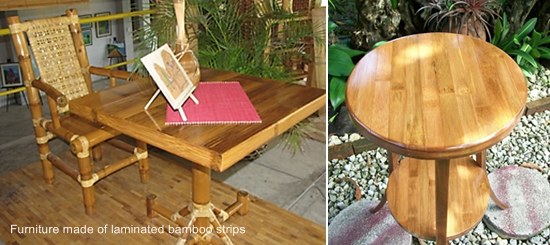
By
DTI-CPG-Bureau of
Philippine Standards
September 17, 2021
MAKATI CITY –
Unique, strong, and versatile – these are some of the
characteristics being attributed to laminated bamboo strips making
it a strategic resource for designing attractive furniture and a
valuable product prized by ingenious craftsmen in the country.
To address the need for a
standard on laminated bamboo strips, the Philippines, through the
Department of Trade and Industry’s Bureau of Philippine Standards
(DTI-BPS), submitted a New Work Item Proposal (NWIP) on laminated
products made of bamboo strips for indoor furniture purposes to the
International Organization for Standardization Technical Committee
on Bamboo and Rattan (ISO/TC 296). The development of such standard
will promote and facilitate international trade of laminated bamboo
and reinforce its value, effectiveness, and competitiveness in the
market; serve as reference for the formulation of a national
standard for laminated bamboo products; and provide guidance to
consumers and other stakeholders with regards to its consumption.
The proposal of the Philippines was approved by ISO/TC 296 last
February 2021.
Laminated bamboo strips,
generally referred to as engineered bamboo in the Philippines, are
bamboo products that are manufactured by fixing together
strips/”slats” from bamboo culms to form a composite material
designed to serve a specific purpose. These products have various
purposes often similar to that of solid wood or laminated wood
products which significantly increase their potential demand in the
market most especially by furniture-manufacturing and construction
firms, designers, manufacturers, and traders of laminated bamboo
products.
The development of ISO
standard on laminated products made of bamboo strips for indoor
furniture purposes is handled by ISO/TC 296/WG 5 - Bamboo for
Furniture. The working group is headed by Dr. Rico Jariel Cabangon,
Deputy Director of the Department of Science and Technology - Forest
Products Research and Development Institute (DOST-FPRDI), as its
Convenor. Dr. Cabangon is also the Chairman of the BPS Technical
Committee on Bamboo and Rattan (BPS/TC 76) that mirrors the work of
ISO/TC 296 and establishes a national consensus position on the
documents of ISO/TC 296. In addition, BPS/TC 76 reviews all the
draft documents and comments of the ISO/TC 296 working groups which
are submitted to the secretariat/convenors.
ISO/TC 296/WG 5 is
composed of experts from the Philippines, China, France, Indonesia,
Malaysia, Ethiopia, Ghana, Colombia, Netherlands, and Nigeria.
The ISO Working Draft on
laminated products made of bamboo strips for indoor furniture
purposes (ISO/WD 6128) specifies the requirements and test methods
for laminated products made of bamboo strips for indoor furniture
purposes including bamboo-wood composite. It does not cover other
laminated bamboo products not made of bamboo strips. It also
specifies handling, storage, packaging, and marking requirements.
ISO/TC 296/WG 5 had its
first meeting last 28 April 2021 in which the working group
discussed the results of voting and comments on the proposal of the
Philippines. It conducts a monthly meeting to deliberate the
contents of ISO/WD 6128 and prepare the Committee Draft for
submission to ISO/TC 296. The working group is set to have its next
meeting on 30 August 2021 to continue with the deliberation.
BPS Director Neil Catajay
congratulated the working group and expressed his hopes to have the
standard completely developed in two years. “The Philippines
endeavor to complete the development of all relevant standards by
ISO/TC 296 as these will significantly contribute to the advancement
of the country’s bamboo and furniture making industry. We look
forward to the support of other countries to the promotion and
improvement of the bamboo industry in the international community,”
Director Catajay shared.
“It is with great pleasure
to serve as the Convenor of the ISO/TC 296/WG 5 to craft standards
on the use of bamboo for furniture purposes. The exchange of
information and practices with technical experts among countries
provides additional knowledge to the members while providing inputs
in the development of international standards to ensure the safety,
quality, and reliability of furniture products from bamboo. This
standardization activity is important to the Philippines as we are
one of the best furniture designers in the world. I thank the
DTI-BPS for all the support as the Philippines leads this
international standardization activity,” said Dr. Cabangon.
The DTI-BPS is a
Participating Member (P-member) to the ISO Technical Committee on
Bamboo and Rattan (ISO/TC 296) since 2015. ISO/TC 296 covers the
standardization of bamboo, rattan, and its derived materials,
including terminology, classification, specifications, quality
requirements, and test methods.
The DTI-BPS is the
National Standards Body authorized to promulgate Philippine National
Standards (PNS). PNS are voluntary in nature and may be used as
reference by any interested parties. The conformance to PNS or parts
thereof become mandatory only when the same is used as reference in
Technical Regulations issued by regulatory authorities.
Independent int’l probe
on human rights violations in PH concludes with damning evidence vs.
Duterte, calls for a UN-led investigation
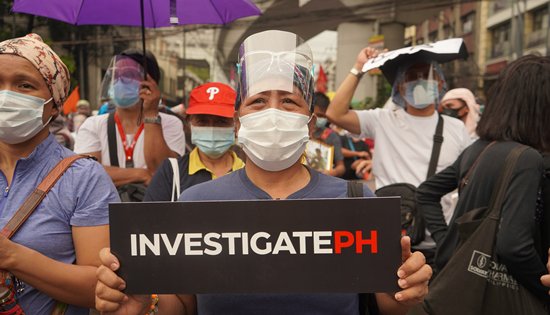
Press Release
September 13, 2021
MANILA – People’s
organisations and civil society groups from all over the world have
urged the United Nations Human Rights Council (UNHRC) to conduct a
probe on human rights violations in the Philippines under President
Rodrigo Roa Duterte at the launch of its Third Report last September
13.
INVESTIGATE PH, an
independent investigation on human rights violations in the
Philippines, aims to substantiate the report on the Philippine
rights situation released by the Office of the High Commissioner on
Human Rights (OHCHR) last June 2020 to help facilitate international
accountability mechanisms.
The Third Report of
INVESTIGATE PH examined violations of the economic, social and
cultural rights of the Filipino people, and the denial of the
people's rights to self-determination, development and peace. It
found that the Duterte government was deliberately violating these
rights through its submission to U.S domination and neoliberal
economic policies. It exposed the Philippine government ending peace
talks with the National Democratic Front of the Philippines (NDFP)
in November 2017, under pressure from U.S. President Trump.
Following this decision, seven peace consultants were killed by
state security forces or unidentified assailants, with five of the
seven being murdered after the June 2020 OHCHR report.
The launch of the report,
which coincides with the opening of the 48th Regular Session of the
UNHRC, was led by the High Commissioners of the investigation,
composed of parliamentarians, lawyers, religious leaders and
activists from across the world. Human rights defenders,
journalists, and various civil society organizations also joined.
“It is imperative that the
Council heed the Filipino people’s call to conduct a probe on the
rights violation under the Duterte administration amid impunity and
failure of domestic mechanisms to provide redress to victims and
hold perpetrators accountable.” Atty. Jeanne Mirer said. Atty. Mirer
of the International Association of Democratic Lawyers is one of the
High Commissioners.
The report concluded that
human rights violations in the Philippines have intensified since
the release of the June 2020 OHCHR report.
It showed that there was a
50 to 76 percent increase in drug war killings per month during the
COVID-19 pandemic lockdowns.
The report also cited
Duterte’s “whole-of-nation” approach to counterinsurgency led by the
National Task Force to End Local Communist Armed Conflict (NTF-ELCAC)
which utilizes local and national institutions to wage attacks
against human rights defenders, people’s organisations and civil
society through mass arrests and detention on trumped-up charges,
“red-tagging”, and state-perpetrated killings.
The abuses have been
worsened by the Anti-Terrorism Act of 2020 which has become a main
instrument in the counterinsurgency program and is used to vilify
activists and their organisations and to criminalize dissent.
The Rev. Dr. Chris
Ferguson of the World Communion of Reformed Churches said: “The
Duterte administration’s systematic attacks against leaders of
peasant and Indigenous People’s communities, peace consultants,
human rights defenders, religious leaders and organizations that are
fighting for people’s rights and pushing for meaningful social
change should be condemned by the international community. It is our
moral responsibility to exhaust all means to put an end to such
atrocious acts and help victims’ in their struggle for justice.”
The three Reports produced
by INVESTIGATE PH this year examine over 50 emblematic cases of
human rights violations under Duterte, including the massacres of
nine Tumandok Indigenous Peoples last December 30, 2020 and of nine
activists on a “Bloody Sunday” last March 7, 2021.
INVESTIGATE PH began its
investigation on human rights violations under the Duterte
administration last December 2020. It released two previous reports
last March and July 2021 respectively.
“The conclusion of our
investigation and the final outcome report exposes how domestic
mechanisms fail victims. As we anticipate the progress report on the
OHCHR’s technical assistance on human rights to the Philippine
government, we, again, call on the High Commissioner and the Council
to mobilise international mechanisms to help victims and hold
Duterte and other state perpetrators accountable.” The OHCHR will
report on the progress of the technical cooperation with the
Philippine government at the 48th UNHRC session on October 7.
Download the Third Report and
Executive Summary
Pull-out of
CARHRIHL, peace talks documents from state university library sets
dangerous pretext for attacks vs. people’s right to info, academic
freedom
By
KARAPATAN
September 13, 2021
QUEZON CITY – The
decision of the Kalinga State University to remove copies from their
library of the Comprehensive Agreement on Respect for Human Rights
and International Humanitarian Law (CARHRIHL) and other public
documents on the peace negotiations between the Philippine
government and the National Democratic Front of the Philippines (NDFP)
“sets a very dangerous precedent in the stifling of the public’s
right to access information and the exercise of academic freedom,”
human rights alliance Karapatan warned.
“What’s next? Raiding and
ransacking libraries and the public burning of books like what the
Nazis did? Removing documents on the peace process from a university
library’s collection is absurd. These are public documents – some of
them, such as the CARHRIHL, were signed by the government. The only
effect that this decision has is to restrict academic discourse and
information on the peace negotiations and armed conflict in the
country,” Karapatan Secretary General Cristina Palabay stated.
Last September 2, 2021,
the director for library services office of the Kalinga State
University Bulanao Campus pulled out at least 11 books and other
publications from the NDFP which they turned over to the Armed
Forces of the Philippines and the Philippine National Police to
supposedly safeguard students and the school from “communist
infiltration.” Along with copies and translations of the CARHRIHL,
among those withdrawn include:
- The Declaration of
Understanding
- The NDFP Declaration and
Program of Action for the Rights, Protection, and Welfare of
Children
- The GRP-NDFP Peace
Negotiations Major Arguments and Joint Statements September 1,
1980-June 2018
- The GRP-NDFP Peace
Negotiations Major Written Agreements and Outstanding Issues
- NDF Adherence to
International Humanitarian Law: Letters to the International
Committee of the Red Cross and the UN Secretary-General
- NDFP Adherence to
International Humanitarian Law: On Prisoners of War
- Two articles on the
People’s Struggles for Just Peace
- The NDFP Reciprocal
Working Committee Perspectives on Social and Economic Reforms
Palabay said that the
publications on the CARHRIHL helped in providing information to
communities on people’s rights and the international humanitarian
law. “Is the government so allergic to knowledge on human rights
principles that it goes down to this kind of censorship?” she asked.
The decision of the
Kalinga State University’s Board of Regents to pull out these
materials was supposedly prompted by the Anti-Terrorism Council’s
designation of the NDFP as a terrorist organization under the
Anti-Terrorism Council. Palabay averred such action “clearly shows
the chilling effect of the terror law on free speech and academic
freedom – such that counter-terrorism effectively represses
information, as well as freedom of thought and knowledge.”
“Libraries, especially
those in schools and universities, should be bastions of
unrestricted access to knowledge, which is necessary for free
academic inquiry and discourse. Repressing access to documents of
the peace negotiations by pulling them out of school libraries is an
attack on academic freedom that does nothing to resolve the roots of
armed conflict and bring about just and lasting peace in the
country,” the Karapatan official said.
“That this action is being
lauded by the Regional Task Force to End Local Communist Armed
Conflict in Cordillera as part of their so-called ‘whole-of-nation’
counterinsurgency campaign is utterly despicable: the government is
simply showing its hand in enabling a brazen attack on academic
freedom to forward its insidious militarist agenda. We strongly call
on schools, universities, and libraries to stand their ground
against such attacks and to safeguard free academic discourse in
their halls. We call on the public to uphold our right to
information,” she ended.
Filipino product
offerings in Woolworths expands to 262 stores despite the pandemic
By
DTI-Foreign Trade
Service Corps
September 9, 2021
SYDNEY – Filipino
product offerings in Woolworths expanded to over 200 stores across
Australia in spite of the pandemic after Australia’s largest
supermarket chain increased its distribution of Pinoy food products
to expand their reach to the Filipino-Australian community.
 Filipino food favorites
such as mixes and sauces, vinegars, noodles, savory snacks,
halo-halo mixed fruits, canned sardines and tuna continue to be
popular among consumers, according to Bob Harris, marketing
consultant for DHN Trading, the importer of the goods.
Filipino food favorites
such as mixes and sauces, vinegars, noodles, savory snacks,
halo-halo mixed fruits, canned sardines and tuna continue to be
popular among consumers, according to Bob Harris, marketing
consultant for DHN Trading, the importer of the goods.
“Some of the stores carry
our full range of Filipino products while other stores are just
starting with a few bestselling items,” Harris said.
Nearly 300,000 Filipinos
live in Australia, making them the fifth-largest ethnic community in
the country, government data show. But beyond this community is the
increasing demand from other markets.
DHN Trading reported that
the expansion of products in the mainstream supermarkets generated a
lot of awareness and increased offtake in Filipino and Asian stores.
“The availability of
Filipino products in Woolworths provides consumers with more
options, convenience and accessibility, but we are also seeing a
multiplier effect on small businesses as they provide niche products
(lutong bahay, kakanins) and services (remittances, cargo and
shipping services, TFC packages) catering to the community. Overall,
the market expands and benefits both consumers and businesses,”
Harris added.
Philippine Ambassador to
Australia Ma. Hellen B. De La Vega said “With Filipino food now more
accessible in Australia’s mainstream supermarkets, along with
hundreds of Filipino grocery or “sari-sari” stores across the
country, we can have a taste of home and share it with our
Australian friends too.”
Travel through Food
Australians can get a
taste of the Philippines through the food products on offer and be
able to cook a savory adobo using the Philippines’ popular vinegar
and soy sauce brands. Aussies can also try making the Filipinos’
sweet style spaghetti using a well-known sauce or banana ketchup
brand. For dessert, they can whip up a halo-halo using ready-to-mix
halo-halo tropical fruits.
Chippy corn snacks, a
childhood favorite of Filipinos and ubiquitous in barkada (mate)
trips, picnics, and movie marathons on weekends, are also available
for Australians to munch on during Netflix moments.
Aside from traditional
Filipino products, Woolworths also carries healthy Philippine
products such as organic coconut water, virgin coconut oil, coconut
flour, banana chips, canned pineapples and other products.
Sustainability Matters
One area the Philippine
Department of Trade and Industry in Sydney is looking at is the
possibility of supplying more premium products such as fresh frozen
items and plant-based meat products. Another area of interest is
sustainable packaging materials that are derived from abaca, banana
and other fibrous plant-based materials.
“Sustainability matters
and we know that this is also aligned with Woolworths’ mission of
providing not only the highest quality products but also innovative
and sustainable packaging solutions,” Alma Argayoso, the
Philippines’ trade representative to Australia said.
Capoocan-diversion
road in progress
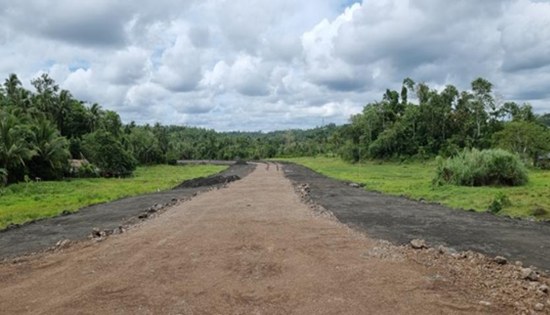
By
GISSELLE G. PARUNGAO
August 31, 2021
CALBAYOG CITY –
Samar First District Engineering Office is undertaking the
construction of a by-pass and diversion road from Barangay Capoocan
to Barangay Dagum (diversion road) which is a multi-year project
that will start in 2020 and is targeted to be completed by 2023.
Phase I of said project
that started in 2020 is an opening of gravel road with a length of
1,227.82 meters and a width of 30 meters. As of July 2021 its actual
accomplishment is at 80.34% and is currently suspended due to
Road-Right-of-Way (RROW) problems that needs to be settled.
While the problem for
Phase I is being resolved, Phase II is already on-going and is at
70.67% actual accomplishment. Scope of work for this phase will
include concreting of road that will span 1,227.82 meters (two
lanes). An off-carriageway improvement (bicycle lane) is also part
of the project’s works with a width of two (2) meters and a length
of 750 linear meters.
The two projects have a
total contract amount of P105.65 million under the General
Appropriations Act of FY 2020 and 2021.
This project will address
the problem on the large volume of traffic along Daang Maharlika
during peak hours starting in Barangay Matobato. Apart from it, this
will also serve as an alternate route for motorists and private
vehicles if ever new businesses will be established (e.g. malls and
other big establishments) wherein other cities or municipalities are
expected to visit Calbayog City.
NMP’s additional
totally-enclosed life boat installed in its davit area
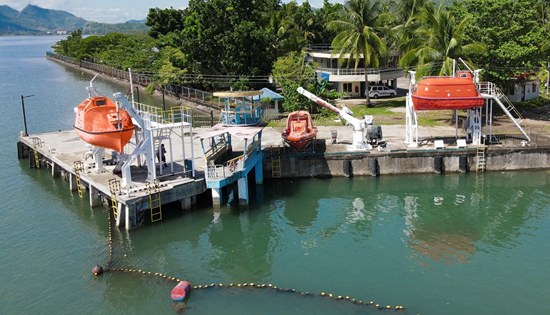
Aerial
view of the NMP Boat Davit: Additional Totally Enclosed Life
Boat on the left corner. |
By
National Maritime
Polytechnic
August 29, 2021
TACLOBAN CITY – The
National Maritime Polytechnic, the premier and only government-owned
maritime training and research center of the Philippines, improves
its maritime training services with the installation of an
additional Totally-Enclosed Life Boat in its Boat David Area.
The said equipment gives
more protection to the passengers during terrible sea conditions
wherein passengers and ship crew are required to abandon the ship
and aboard the totally-enclosed life boat. It can keep the
passengers dry and safe from seawater with its fixed watertight
design and can also get upright on its own even when overthrown with
waves.
It is used in the delivery
of the Survival Craft and Rescue Boats Other Than Fast Rescue Boats
(SCRB) both full and refresher courses which is open to all
seafarers who have completed the Basic Training (BT) course.
The SCRB course aims to
provide survival techniques and proper operation of the survival
craft or rescue boat during evacuation and after the abandonment of
the ship, use of locating devices, including communication and
signaling apparatus and pyrotechnics, and managing and application
of first aid to survivors.
For more information
regarding the said course and other NMP training programs, clients
may visit the NMP website (www.nmp.gov.ph) and facebook page (www.facebook.com/nmptrainingcenter)
where all related information on NMP trainings including its online
classes are available. Courses may be enrolled online through this
link: reserve.nmp.gov.ph.
Likewise, NMP research
undertakings can be accessed through the e-Research Information
System Portal embedded in the NMP’s website which is designed to
disseminate NMP completed researches, present the Research Agenda,
and engage the industry stakeholders to collaborate in the research
activities.
Further, NMP encourages
OWWA registered seafarers to avail of the NMP-OWWA (Overseas Workers
Welfare Administration) Seafarers’ Upgrading Program (SUP) and
Skills for Employment Scholarship Program (SESP) which entitles the
beneficiary to receive financial assistance for training costs from
the OWWA.
DPWH Leyte II
launches multi-year Burauen bypass road project
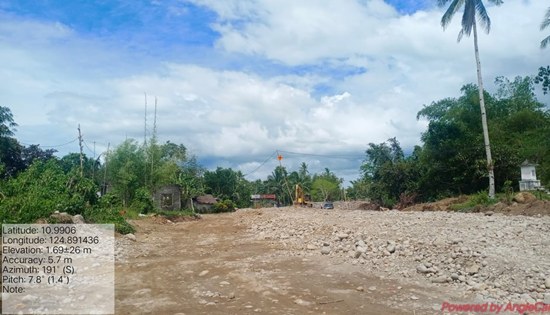
By
DPWH 2nd LED
August 25, 2021
BURAUEN, Leyte – To
optimize traffic that are faced daily by the motorists, the
Department of Public Works and Highways -Leyte Second District
Engineering Office is now constructing a multi-year bypass road
project in the town of Burauen Leyte.
According to District
Engineer Leo Edward L. Oppura, the construction of bypass road
project will start in Brgy. Maghubas along the
Jaro-Dagami-Burauen-La Paz Road and will end in Brgy. Balorinay
along Dulag-Julita-Burauen Road.
“This road project will be
beneficial to the motorists as this will serve as an alternate route
to divert traffic within the congested Public Market in Poblacion
Burauen,” Oppura added.
For this year, the
district office allotted P37.1-million to construct a total of
.64-kilometer Portland Cement Concrete Pavement (PCCP) out of the
4.50-kilometer total road length of the bypass road.
The project started last
June 03 and will be completed on or before November 09 of this year.
Roadway lighting will be
installed to improve visibility and safety of the motorists
especially during night-time. Pipe culverts and stone masonry works
are also included in this project for its drainage and slope
protection.
This bypass road will not
only serve as an alternate route but it is also beneficial to local
residents along the bypass road area. Existing gravel road will be
concreted, providing them with better opportunities and faster
mobility.